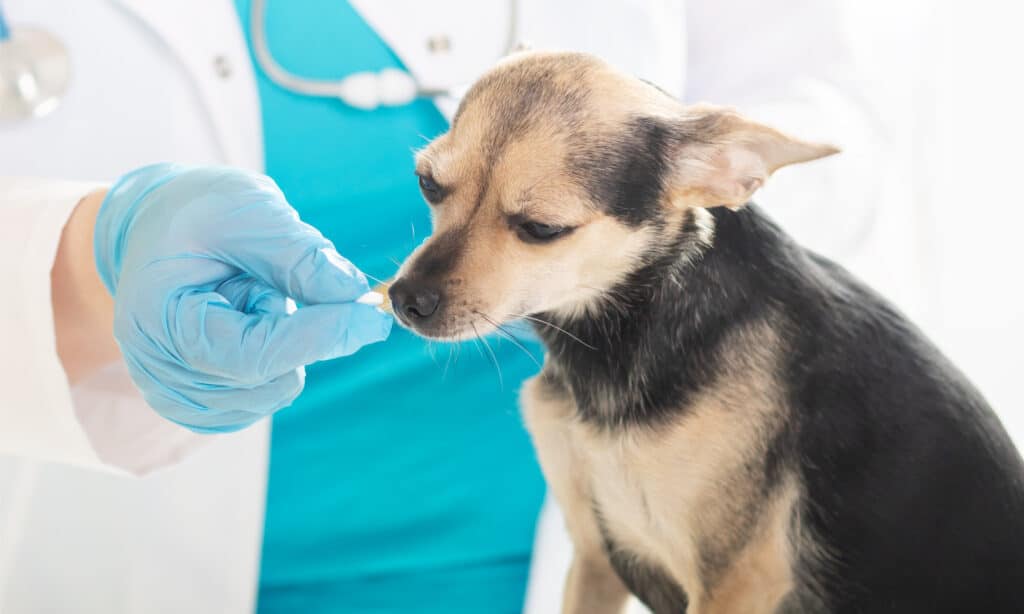Benadryl is a popular medication worldwide. This well-known antihistamine targets issues ranging from irritating allergies to insomnia. It’s a staple in most medicine cabinets.
Benadryl is useful to humans in a variety of ways, but can it help our canine companions as well? While Benadryl is safe for use in dogs, there are a few details you need to know before offering it to your furry friend.
In this article, we discuss everything you need to know about Benadryl for dogs, ranging from safe dosing to potential side effects. Let’s get started!
What Is Benadryl?

This popular antihistamine can be purchased over the counter.
©iStock.com/Yana Tikhonova
Benadryl, or diphenhydramine, is a popular over the counter medication that is classified as an antihistamine. It works by blocking the receptors in the body that receive histamines. This ultimately minimizes the body’s allergic response to an allergen.
It’s often used to treat minor allergy symptoms, hives, cold symptoms, and itchy skin from insect bites. Though it is effective for these conditions, it is not often used long-term due to its sedative properties. Benadryl is known to cause drowsiness or dizziness, so it is only ideal for occasional use.
Is Benadryl Safe For Dogs?
Benadryl is safe for dogs when used as directed by your veterinarian. It can be used to manage minor seasonal allergy symptoms, minor skin itchiness, and minor reactions to insect bites. For more severe allergic reactions, it can also be used alongside prescription steroids. It can help to manage any residual symptoms in the days to follow.
Benadryl can be effective in treating minor allergy symptoms in dogs, but it is typically only recommended for short term use. There are more effective treatment options when it comes to managing chronic allergies in dogs.
Why Do Dogs Take Benadryl?

Allergies can lead to red, itchy skin and discomfort in dogs.
©iStock.com/adogslifephoto
As we mentioned above, Benadryl is often used to manage minor allergy symptoms in our canine friends. Here are a few of the most common allergy symptoms that Benadryl can help alleviate:
- Sneezing
- Itchy skin
- Mild hives
- Skin redness
- Watery eyes
- Nasal discharge
While Benadryl can alleviate the symptoms above, it is only recommended for acute allergy cases in dogs. If your dog is suffering from chronic allergies that are impacting quality of life, then Benadryl is not the best treatment option.
If your dog is experiencing facial swelling, severe hives, or changes in breathing, seek veterinary care ASAP. We do not suggest offering Benadryl before visiting the vet, as your vet will administer appropriate medications upon arrival.
What Is the Recommended Benadryl Dose for Dogs?
You should always speak with your vet before giving your dog Benadryl. A professional can offer an appropriate dose based on your dog’s size and symptoms. However, there is a generic dosing range that most veterinarians will follow.
The standard dose of Benadryl for dogs is 1mg per pound of body weight every eight to 12 hours. For example, if you have a 25-pound dog, then you could offer him a 25mg dose of Benadryl. Just remember to get permission from your veterinarian first.
Benadryl can be found over the counter in pill and liquid form, with the liquid being classified as children’s Benadryl. Liquid children’s Benadryl has a lower concentration than Benadryl for adults. You can always use this form of Benadryl if you have a toy or small breed dog.
Are There Benadryl Side Effects in Dogs?
Just as with any other medication, there are a few side effects that are known to accompany Benadryl use. Some of the most common side effects include:
- Drowsiness or sedation
- Agitation
- Disorientation or appearing wobbly on their feet
- Vomiting
- Diarrhea
- Changes in behavior like aggression or anxiousness
Many pet parents assume that Benadryl will make their pets tired, but this is not the case for all canine friends. Some dogs will experience agitation and restlessness when taking Benadryl. For these reasons, it is not ideal to rely on it as a sedative.
Is Benadryl Dangerous for Some Dogs?
Benadryl is generally safe for dogs when following your vet’s guidance, but there are some canine companions that have a higher risk of adverse effects when taking the medication. Benadryl should not be used in dogs with cardiac disease, kidney disease, liver disease, seizure disorders, or those that are pregnant.
You should also keep Benadryl away from dogs that are currently taking other medications, as this could lead to dangerous drug interactions.
Can I Give My Puppy Benadryl?
We do not suggest giving your puppy any form of Benadryl without veterinary approval. Puppies may process medications differently than adult dogs, and this can increase the risk of adverse side effects. We suggest reaching out to your veterinarian if you think your puppy is struggling with allergy symptoms.
Can Benadryl Help My Dog Sleep?

Benadryl can lead to drowsiness in some dogs, but it will impact every canine friend differently.
©Roschetzky Photography/Shutterstock.com
Pet parents with rambunctious dogs may feel tempted to offer Benadryl as a calming agent, but this is not an ideal solution in many cases. Benadryl has been known to cause agitation and restlessness in some dogs, causing them to bounce of the walls!
It’s best to reach out to your vet if you are interested in a safe sedative option for your dog. This is especially true if you are looking to offer sedation for an anxious or scared canine friend.
Can Benadryl Help Chronic Allergies in Dogs?
Benadryl can take the edge off of minor allergy symptoms in dogs, but it is not ideal for dogs with chronic allergies. It may offer relief temporarily, but it is not targeting the damaging inflammatory cycle that allergies cause. Benadryl is only a band-aid.
If your dog suffers from chronic or seasonal allergies, then we suggest speaking with your vet about prescription options like Cytopoint or Apoquel. These are much more effective in managing canine allergies long-term, as well as the secondary ear and skin infections they cause.
Is Benadryl Cream Safe for Dogs?
Now that we’ve discussed the safe use of Benadryl in dogs, you may wonder if this stands true for Benadryl creams and sprays as well. Benadryl creams and sprays are typically safe to use in dogs with minor skin irritation due to insect bites or contact allergies, but there are a few safety tips you need to keep in mind.
First, we do not suggest applying any topical cream to a part of the body your dog can access through licking. This can lead to GI upset or mouth irritation.
Benadryl cream should also only be used with mild cases of skin irritation due to allergies, as using it in any other situation could lead to further irritation in the area.
When in doubt, always reach out to your vet for guidance.
Final Thoughts
Benadryl is safe for use in dogs when following your vet’s skilled guidance. Be sure to review the information we discussed above, and you can better understand the use of this popular antihistamine in our canine companions.
The photo featured at the top of this post is © JOKE_PHATRAPONG/Shutterstock.com
Ready to discover the top 10 cutest dog breeds in the entire world?
How about the fastest dogs, the largest dogs and those that are -- quite frankly -- just the kindest dogs on the planet? Each day, AZ Animals sends out lists just like this to our thousands of email subscribers. And the best part? It's FREE. Join today by entering your email below.
Thank you for reading! Have some feedback for us? Contact the AZ Animals editorial team.






